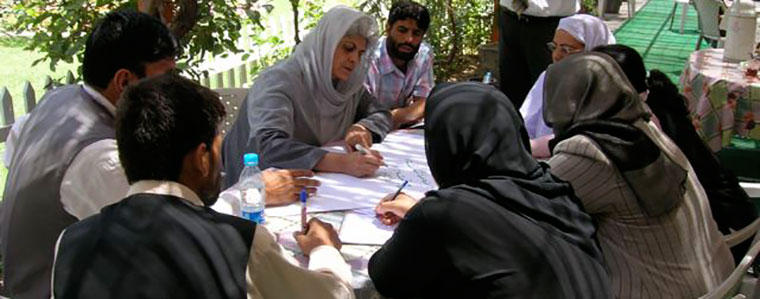
One of the most satisfying things about my job as an international conflict resolution trainer for USIP is when I see the impact of my training activities in the field. As a trainer for USIP's Academy, keeping in touch with the people I have trained in conflict zones can be a challenge. Lack of Internet activity, displacement due to conflict, and physical safety are but a few challenges we all encounter when we work in conflict zones.
Afghanistan is a perfect example of all three challenges USIP faces when conducting capacity building training projects on the ground. While we maintain contact with many of the people we train, there are those we simply lose touch with. But during a recent trip to Afghanistan I had the unique experience of running into one courageous woman I trained a few years ago.
The last time I was in Afghanistan was three years ago and things certainly looked and felt different. Despite an obvious increase in the number of police officers in Kabul, the situation is more insecure and the atmosphere more tense. The looming U.S. drawdown is welcomed by some and feared by many. The consequences for women are even more alarming as recent Ulema decisions – those passed by legal scholars who interpret Sharia law – have restricted women's rights, and the possibility of a peace deal with the Taliban threatens the gains women have made in the past few years. Regardless, Afghan women continue to push ahead, working to ensure and expand their rights.
That's why it was so gratifying to see just how hard they are pushing ahead. During my recent trip, we were meeting Afghan human rights activists, lawyers and judges and in walked a familiar face. Her name was Maryam (her name has been changed for security reasons). I worked with her in 2008-2009 but when I saw her she immediately began to explain the impact of the training she had received from USIP in conflict resolution from that time four years ago. She continued, saying that conflict resolution is a priority for her NGO and that she has incorporated the USIP frameworks and theories into her work and has been training others. What a great experience it was to hear this directly from a participant four years later!
Maryam established her NGO in the early 1990s in Kabul educating and advocating for women. She told me that she remained in Afghanistan during Taliban rule, taking her activities underground, never discontinuing her efforts. She was an original participant in at least two USIP train-the trainers programs, in collaboration with a local partner, that were started in 2008. She told me that she had incorporated much of what she learned into her current projects. Maryam's fearless work fighting for women's rights has never stopped. Seeing her again and hearing how she has been implementing the training she received from USIP reminded me once more of the value of giving local peacebuilders the tools they need to spread the word and help their communities on their own.



